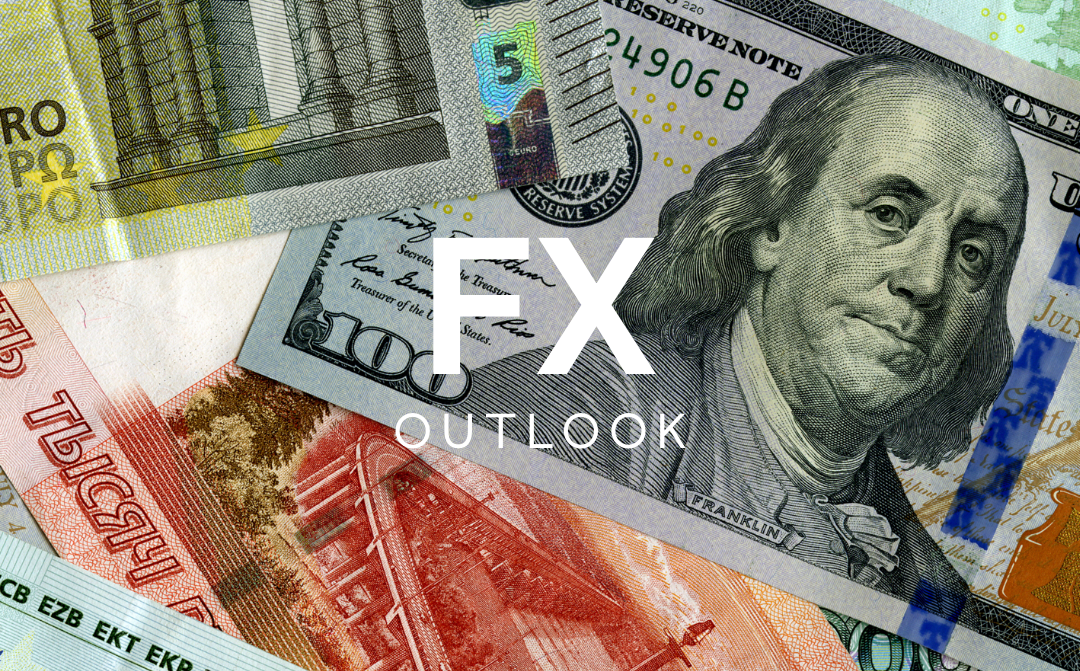16 Oct FX outlook – USD, EUR, GBP, CAD, AUD, NZD

Table of Content
USD
The tension in the Middle East between Israel and Palestine dominated the headlines this week, with the US dollar enjoying some haven flows at a time when the FOMC has started to drop notably dovish comments. While bank holidays in Japan, the US and Canada had brought expectations of a slow start last week, the Hamas attacks in Israel sparked market volatility as investors rushed towards safe-haven assets and commodities. Interestingly, US dollar gains proved short-lived, thanks in part to increasingly dovish comments from FOMC members. The release of FOMC minutes seemed to reiterate the tone taken by several members, with the chance of a final 2023 rate hike appearing to fade.
However, last Wednesday’s US consumer price data exceeded analysts’ expectations, resulting in a boost for the USD due to investors pricing in the “higher for longer” narrative from the Fed. To add to the previous report, unemployment claims remained unchanged at 209k, failing to meet the forecast of 211k. The Dollar index, which tracks the performance of the US dollar against other assets, rebounded from 105.50 as it closed out the week on a positive footing. With inflation moving higher on rising energy prices, the prospect of a Israeli push into Gaza brought risk-of sentiment as we closed out the week.
Heading into the new week with geopolitical tension remaining at the center stage, the US earnings season will share in the spotlight as major players will be reporting their financial position in the last quarter. Thus far, a strong showing from the banks has helped ease concerns, with some speculating that lowly expectations could help companies beat a relatively low bar. This week is jam-packed full of Fed appearances, meaning that we will see plenty of commentary in the wake of last week’s inflation gauge.
EUR
Investors were risk-averse towards the Euro due to weak economic reports and dovish ECB remarks, which hurt the currency, dropping into the loser’s net as it lost about -0.16% of its value from the previous week.
Amidst the ongoing conflict between Russia and Ukraine, the economy of the eurozone may encounter additional stress from energy prices, as the recent tension in the Middle East may result in a surge in oil prices which has been a significant factor driving inflation. The European Central Bank recently decided to maintain its interest rates at a high level for an extended period. ECB President Lagarde’s words further supported this decision. She emphasized that the bank would closely watch the effects of previous actions before considering another rate increase, with that data dependent approach likely to be a common theme going forward. While the initial response had been to consider the tightening phase over, it is key to note the impact of rising energy prices on inflation going forward.
Looking ahead, we are faced with a handful of tier two data points such as the ZEW economic sentiment, and final CPI figures. Keep a close eye out for European gas prices, with the recent spike to six-month highs bringing additional concern over a possible second wave of inflation.
GBP
The pound has experienced a somewhat indecisive week just gone, with the currency coming full circle as gains seen around Monday and Tuesday were reversed as we headed into the weekend. This continues the wider theme of weakness, with the dovish shift from the Bank of England serving to maintain the pressure on the pound.
The Bank of England’s decision to shift onto a more dovish stance will be heavily driven by the concerns around the economy, with the belated effect of higher interest rates kicking in. With that in mind, markets should remain sensitive to economic data as a backdrop to BoE thinking. Last week saw a raft of data points released on Thursday, headed up by the 0.2% GDP figure for August. Despite that return to growth, the NIESR GDP forecast signalled a potential September contraction. With industrial production, manufacturing production, and construction output all contracting in August, there is a clear concern over the direction of travel for the UK economy.
Look ahead, this week has a particular UK theme, with Tuesday’s jobs report kicking off a period that also sees inflation (Wednesday) and retail sales (Friday) due. Inflation is the obvious highlight, with 0.1% decline seen last month raising concerns that the path back to target will a hard fought one. Energy prices have been on the rise, with Dutch gas up to a six-month high last week. Therefore, any early sign that we are seeing energy prices push headline CPI higher could raise the risk of another hawkish shift from the BoE. Wages are another issue that Europe has been struggling with, and Tuesday’s jobs report will see average earnings as a key component given the impact it will have upon inflation levels. Last month’s 8.5% reading marked the second-highest reading in over 20-years, but the run of four successive gains could finally end according to predictions of a decline this month.
CAD
The Canadian dollar rose this week on the back of surging oil prices due to geopolitical tensions in the Middle East. At the start of the trading week, crude oil prices rose by over 200 points as Investors increased their positions in anticipation of a response from other Arab nations with the conflict stretching throughout the week. The Canadian Economy which is a major exporter of crude saw its currency gain but struggled against the US dollar which was supported by rate hike sentiments. The prospect of an Israeli ground offensive brought concerns over a potential spill over into a wider Middle Eastern conflict. While trade routes remain unaffected for now, any involvement from the likes of Iran could see crude and CAD strengthen as the outlook for Iranian supply and the security of key trade routes come into question.
On the Economic front, a very light calendar saw all the focus remain on energy prices. Looking ahead, the continued influence of events in the Middle East are joined by data in the form of Canadian inflation and retail sales. The rise in Canadian inflation over the past two-months will have helped the cause for CAD bulls, with Tuesday’s inflation reading set to provide fresh volatility. Elsewhere, mid-tier economic data will likely be overlooked somewhat as markets focus on the potential repercussions of the conflict in Israel and its neighbours.
AUD
The Australian dollar found itself on the back foot once again last week, with the stability seen throughout the early part of the week giving way to widespread downside over the course of Thursday and Friday. In part that appears to be a response to the risk attitudes seen throughout global markets, with traders increasingly hesitant to hold positions into the weekend given the possibility of a major ground offensive from Israel. While that hasn’t come to fruition, it appears a matter of time. Aside from that, the Australian dollar remains particularly sensitive to the Chinese growth story, with the two countries heavily intertwined from a trade perspective.
Last week was largely devoid of major economic data out of Australia, with the main events of note coming in the form of the Westpac consumer sentiment (2.9%) and inflation expectations (4.8%). Notably, the rise in inflation expectations served to highlight the ongoing battel faced by the RBA. However, the expectations of a mere 1.2% growth in total pay over the coming year do help alleviate concerns that the country will be stuck in an inflationary cycle. One place that certainly doesn’t need to drive down inflation is China, with the latest CPI reading of 0% serving to highlight the lackluster nature of Chinese economic activity of late.
Looking ahead, this week promises to be a busy one for Australian and Chinese economists alike. The Australian calendar looks set to be dominated by the RBA rate decision minutes, and inflation report. With the new RBA Governor Bullock in the hot seat, the minutes will provide greater insight into whether there are any changes afoot despite a remarkably similar approach at the rate decision itself. She is due to appear for a fireside chat on Tuesday, allowing a more detailed assessment of the Australian economy. Meanwhile, China comes into focus mid-week, with the release of GDP, retail sales, industrial production, unemployment, and fixed asset investment data. These data points should provide a full spectrum of signals over the health of the economy. With the RBA retaining a data dependent approach, this week looks like a volatile one for the Australian dollar.
NZD
The New Zealand dollar spent much of the week on the back-foot, with the currency losing traction against most of its peers. The Kiwi has enjoyed a strong period thanks to events in Europe, with the dovish switch from the BoE and ECB helping to reverse EURNZD and GBPNZD longs. However, the past week has seen the bears back in the driving seat, as concerns in the Middle East take a toll on risk assets.
Last week saw a relatively quiet economic calendar in New Zealand, with people instead gearing up for a crucial election that brought increased uncertainty. The National Party did take control, bringing a change of government. However, early gains have been somewhat muted in response. Last week also saw the Chinese inflation survey, with both CPI and PPI both below expectations. Looking ahead, Monday brings the crucial inflation report, with the quarterly CPI expected to pop higher to 1.9% (from 1.1%). With the RBNZ taking a data dependent stance, a surge in inflation could yet put pressure on the bank to consider the direction of travel for New Zealand prices. Also watch out for global dairy prices, with any continues strength likely to benefit NZD. On the China front, a raft of midweek data brings the possibility for AUD and NZD volatility as we weigh up the prospect of a recovery in the region.
Disclaimer: This material is a marketing communication and shall not in any case be construed as an investment advice, investment recommendation or presentation of an investment strategy. The marketing communication is prepared without taking into consideration the individual investors personal circumstances, investment experience or current financial situation. Any information contained therein in regardsto past performance or future forecasts does not constitute a reliable indicator of future performance, as circumstances may change over time. Scope Markets shall not accept any responsibility for any losses of investors due to the use and the content of the abovementioned information. Please note that forex trading and trading in other leveraged products involves a significant level of risk and is not suitable for all investors.







